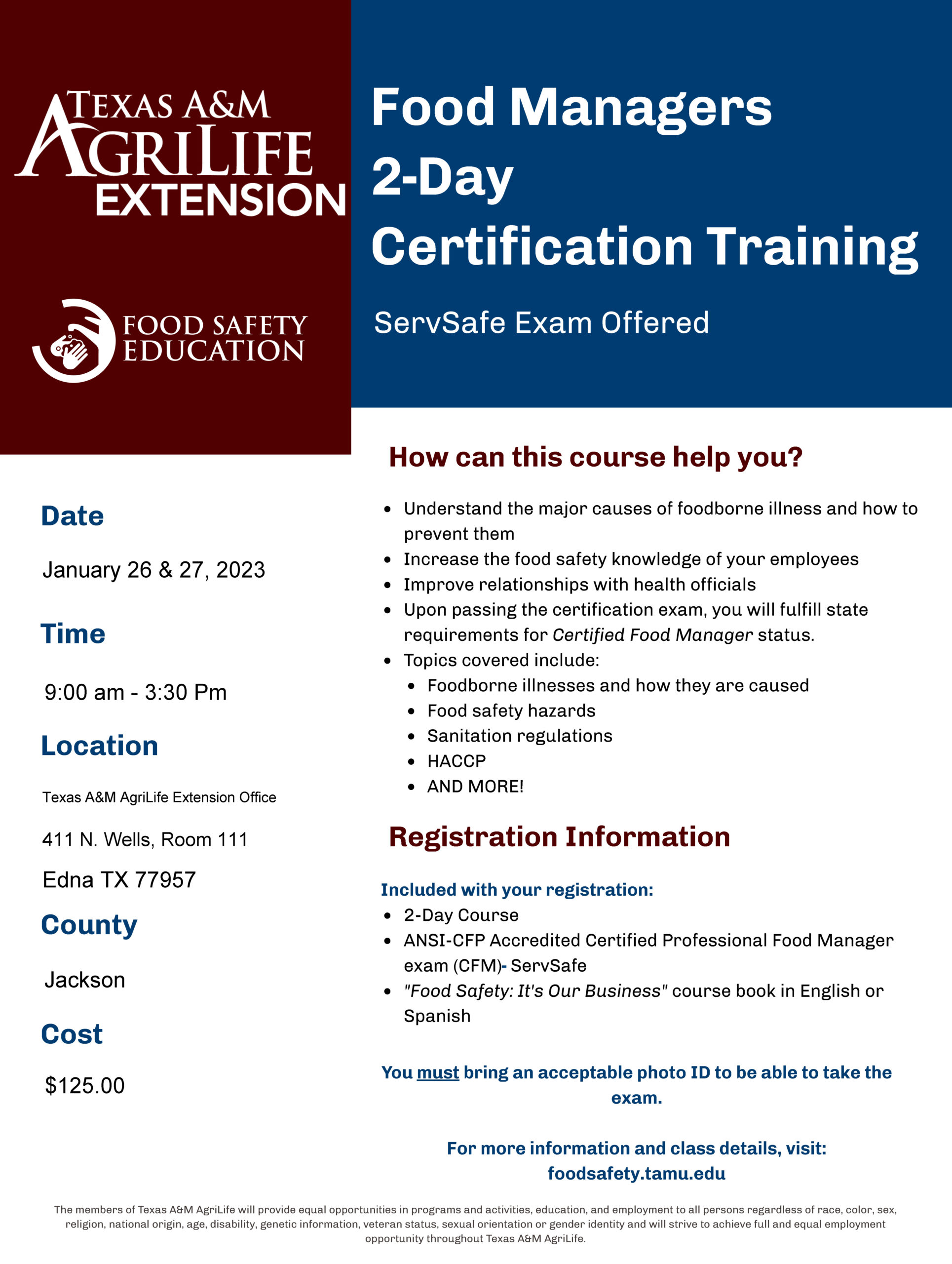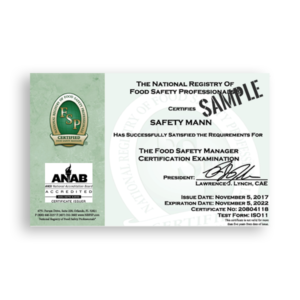Preparing for the ServSafe Manager Exam: Trick Subjects to Evaluation
Preparing for the ServSafe Manager Exam: Trick Subjects to Evaluation
Blog Article
Licensed Food Manager: The Secret to Safe and Compliant Operations
The function of a Qualified Food Supervisor (CFM) is significantly identified as important in maintaining secure and compliant procedures within the food solution sector. By implementing rigorous food handling and preparation requirements, CFMs play a critical role in mitigating threats related to foodborne diseases and making sure adherence to governing demands. The effect of their proficiency expands past compliance; it promotes a setting of liability and operational performance. Understanding the complete scope of their contributions increases inquiries regarding the wider effects for organizations and consumer count on in food safety and security methods.
Duty of a Certified Food Supervisor
The function of a Qualified Food Supervisor is essential in making sure food security and compliance within food solution establishments. These specialists are in charge of supervising all elements of food storage, handling, and preparation, guaranteeing that centers follow health policies and sector requirements. Their training equips them with the expertise to recognize prospective dangers, carry out correct food security methods, and maintain hygiene procedures.
Licensed Food Managers play a crucial function in training and managing cooking area team, instilling a society of safety and security and conformity throughout the establishment. They perform routine evaluations to recognize areas that require enhancement and ensure that rehabilitative activities are implemented quickly - Food Manager Certification. In addition, they are entrusted with establishing and enforcing conventional operating treatments (SOPs) pertaining to food security, which work as an overview for employees
Their competence includes checking food temperatures, avoiding cross-contamination, and taking care of irritant controls, every one of which are vital to shielding public wellness. Licensed Food Managers are often the main point of contact during health and wellness examinations, representing their facilities and dealing with any type of compliance concerns elevated by wellness authorities. Inevitably, their dedication to food safety and security is important for maintaining consumer trust fund and securing the credibility of food solution companies.
Value of Food Security
Food security is consistently a top concern in the food solution industry, as it directly impacts public health and wellness and customer self-confidence. Ensuring that food is managed, prepared, and stored safely aids to protect against foodborne diseases, which can result in severe wellness complications and also casualties. The economic repercussions of foodborne episodes can be shocking, leading to expensive recalls, legal actions, and substantial damage to a business's track record.
In addition, food safety and security methods promote a culture of liability and professionalism and trust within food facilities. When workers are trained in proper food managing methods, they are much more likely to comply with safety protocols, which minimizes the danger of contamination. This not just protects consumers yet likewise boosts operational effectiveness and conformity with neighborhood wellness guidelines.
Consumer understanding pertaining to food safety has actually raised considerably, bring about enhanced expectations for openness and quality in food solution. Facilities that focus on food security are more probable to acquire client count on and loyalty, inevitably adding to their long-term success. Investing in robust food security measures is not just a regulative responsibility; it is a fundamental business method that profits both customers and food solution operators alike.
Training and Accreditation Process
Recognizing the training and qualification procedure for food managers is essential for maintaining high requirements of food safety and security within any facility. The process generally begins with extensive training programs that cover important topics such as foodborne health problems, correct food dealing with strategies, and cleanliness methods. ServSafe Manager. These programs can be delivered with various styles, including on-line courses, in-person courses, or workshops, and are designed to outfit food managers with the expertise required to stop food safety hazards
Upon conclusion of the training, candidates must pass a qualification test, which analyzes their understanding of food security principles and regulations. The examination is usually provided by approved companies, ensuring that the accreditation is identified and valued within the market.
When accredited, food supervisors are needed to stay existing with continuous education and learning and training to maintain their credentials. This might include going to refresher course training courses or taking part in workshops that resolve brand-new food safety and security methods and guidelines. Generally, a durable training and certification procedure not just enhances the abilities of food managers but likewise adds to the overall security and conformity of food procedures in any type of facility.
Compliance With Laws
Conformity with regulations is a critical aspect of a food supervisor's duties, as it ensures that facilities abide by regional, state, and government food safety and security criteria. These regulations are created to alleviate threats linked with foodborne illnesses and advertise risk-free food managing methods. A certified food manager (CFM) plays a critical duty in analyzing and applying these requirements within their procedures.

CFMs must also create and implement surveillance systems site to routinely assess conformity with food safety methods. This may include routine inspections, record keeping, and training sessions for team to reinforce safe food taking care of procedures (Certified Food Manager Certification). In the event of a regulative assessment, a CFM's readiness can significantly influence the end result, as they will be accountable for showing adherence to all pertinent guidelines. Ultimately, reliable compliance administration promotes a culture of safety and responsibility within food solution procedures.

Benefits of Working With CFMs
Hiring certified food managers (CFMs) supplies substantial benefits for food service facilities looking for to enhance their functional effectiveness and security criteria. CFMs possess specialized expertise of food safety and security guidelines, cleanliness practices, and threat monitoring, guaranteeing conformity with neighborhood and government legislations. This competence assists lower the probability of violations that can lead to expensive penalties or short-term closures.
Additionally, CFMs play an essential role in training personnel, fostering a culture of food safety within the establishment. They carry out standardized procedures, screen food handling methods, and perform regular audits, substantially minimizing the risk of foodborne diseases. This not only secures patrons but additionally enhances the facility's credibility.
Additionally, employing CFMs web link can cause improved operational effectiveness. Their training allows personnel to work better, reducing waste and making the most of productivity. Establishments with licensed food managers typically experience greater client complete satisfaction, as trained employees are better geared up to guarantee quality solution and food security.

Inevitably, purchasing a licensed food supervisor is a financial investment in the long-lasting success and sustainability of a food solution operation, developing a safer environment for both employees and clients.
Final Thought
Finally, the function of a Licensed Food Manager is vital in maintaining certified and secure food service operations. Through reliable oversight of food dealing with practices, recurring team training, and adherence to regulatory requirements, CFMs play an essential role in mitigating foodborne illness dangers. The investment in licensed management not just check here enhances functional performance yet also promotes a culture of liability, inevitably benefiting both the establishment and its customers while advertising public health and safety and security.
The role of a Licensed Food Supervisor is vital in making sure food safety and conformity within food service facilities.Understanding the training and qualification procedure for food supervisors is important for preserving high standards of food safety and security within any type of facility. In general, a durable training and certification process not just enhances the skills of food managers however likewise adds to the total safety and compliance of food operations in any kind of facility.
Employing licensed food managers (CFMs) supplies significant advantages for food solution facilities seeking to boost their functional effectiveness and safety and security criteria. Facilities with qualified food managers often experience greater client satisfaction, as well-trained employees are much better furnished to guarantee quality solution and food safety and security.
Report this page